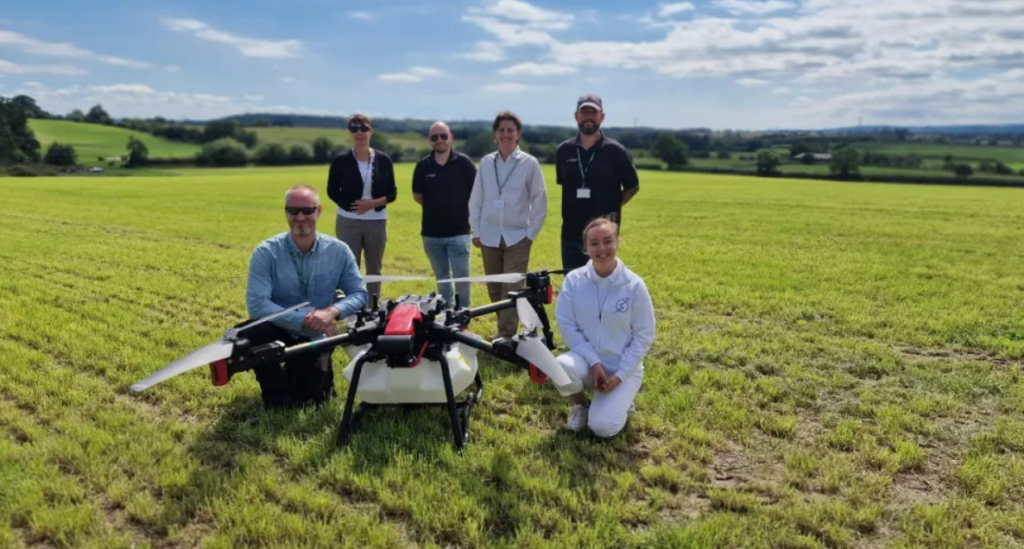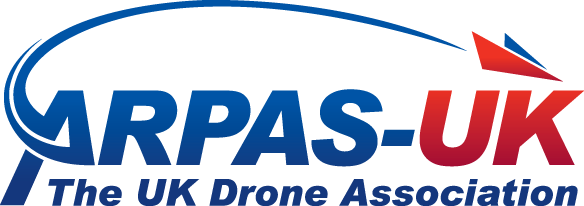A consortia involving ARPAS-UK Members and using drone technology to revolutionise how landowners, environmentalist and conservationists manage the UK’s vast peatland carbon sink resources has today unveiled their programme to deliver the UK’s first carbon negative aviation project.
Project “Drone RePeat” was recently awarded £500,000 from Natural England’s Paludiculture Exploration Fund to increase awareness of Paludiculture and carbon sink management through greater use of emerging technologies and new agronomy methods.
With a focus on promoting sustainable land use practices that are environmentally friendly, socially beneficial and economically viable, the programme seeks to use drones to survey, analyse then precision-spray peatlands to seed Paludiculture crops and monitor irrigation and carbon depletion from the soil, creating new ways for landowners to realise value from these difficult-to-manage landscapes.
To scale the project and it’s the carbon negative mandate, the SEAD Artists team are working closely with the CAA to unlock ultra-low level airspace to allow regular airspace access for landowners, asset managers and contractors to use agri-drones and other innovative technologies in low-level airspace above farmland and peatland.

Andrew Sproson, Co-Founder of Autospray Systems and Project Lead for Project Drone RePEAT said “We’re genuinely excited by the potential drones have to revolutionize the UK’s paludiculture industry,” Andrew continued. “The ability to operate drones over greater distances increases efficiency, creating a framework that allows for scalability and easier drone adoption. This in turn not only enables drone spraying and spreading for current and future Peat Restoration projects, but crucially enables the creation of a commercial market for lowland land owners across the UK, encouraging wider adoption.
“Preserving England’s largest Carbon Sink is as important as reducing the speed at which the world’s icebergs are melting – once they’ve degraded, peatland takes centuries to re-establish but the crops and moss identified through our trials have been proven to preserve peat and thus contribute toward reducing the benchmark of peat emissions.
Gareth Whatmore, project partner and founder of DronePrep, which was the architect of the first real-world drone deliveries in England and Scotland for the NHS and Royal Mail, said: “Peat is England’s single largest Carbon store, with 1 million acres of peat soils storing 584m tonnes of carbon – that’s the equivalent of 540 coal-fired power stations! Peat takes millennia to generate, and bogs store 10 times more carbon than forests.
“Degradation and draining mean these peatlands emit around 11 million tonnes of CO2 into the atmosphere every year so improving their management and encouraging restoration is a key part of the UK’s Net Zero strategy.
“The challenge for landowners is that cultivating or restoring peatland is often difficult, due to its bogging and inaccessible nature.
“Our work has demonstrated that tech solutions, such as the use of drones, can not only help landowners manage their peatland and plant crops to preserve peat stocks but can also support the growing of new, peat-hardy crops that can be manufactured into Net Zero clothing or construction materials.”
Most drones are powered by electricity and Drone RePeat’s calculations suggest the potential carbon gains that could be realised by managing this important but delicate landscape through reduced peatland degradation, maintenance of large carbon sinks and the commercial exploitation of peat-hardy crops, will effectively make the drone flights enabling this innovative approach carbon negative.
Aleks Kowalski, Project Manager of Drone RePeat added, “To respond to the climate emergency the Drone RePEAT team have also formed a partnership called SEAD Artists to develop how our innovative technologies can apply to future carbon management and climate credit schemes which can bring external investment, given that work outside of the Paludiculture project is be focussed on programmes to plant trees via drones at scale. We call on all COP28 delegates and Climate Fund Managers to create a service that allows companies to invest in this technology to match their COP28 objectives and carbon liabilities.”
Jim Milner, Natural England – Paludiculture Exploration Fund project manager, said: The Paludiculture exploration fund aims to explore new crops and products that can grow on wet peat soils. As Gareth says, this creates challenges in managing those new crops we hope to develop and new solutions are needed. This is where SEAD Artists fits in and it is great to see how the team at Drone RePeat is connecting with the wider Paludiculture community.”
The Drone RePeat project consists of the SEAD Artists consortia which currently include the following organisations:
- Aerofirm – a world-leading safety case expert around Beyond Visual Line of Sight (BVLOS) flight
- AutoSpray Systems – the only UK company permitted to use drones for land spraying and spreading, allowing aerial application of seeds, spores, fertiliser and nutrients to England’s peatlands
- DronePrep – architects of the first real-world drone deliveries for NHS and Royal Mail, and experts in land ownership and airspace approvals
- Skypointe – Facilitating connections and insights across multiple technology domains, bringing together domain expertise from over 20 years in manned aviation, uncrewed systems, digital systems with heavy involvement in trade association, regulatory and standards work.
- TAPSW – A software firm est 2010, are real time data integration specialists focusing on audits at a distance to track, monitor, and evidence events aiding agronomists and agriculture stakeholders in their decision making processes.
For further details, contact info@seadartists.com
15 January 2024


